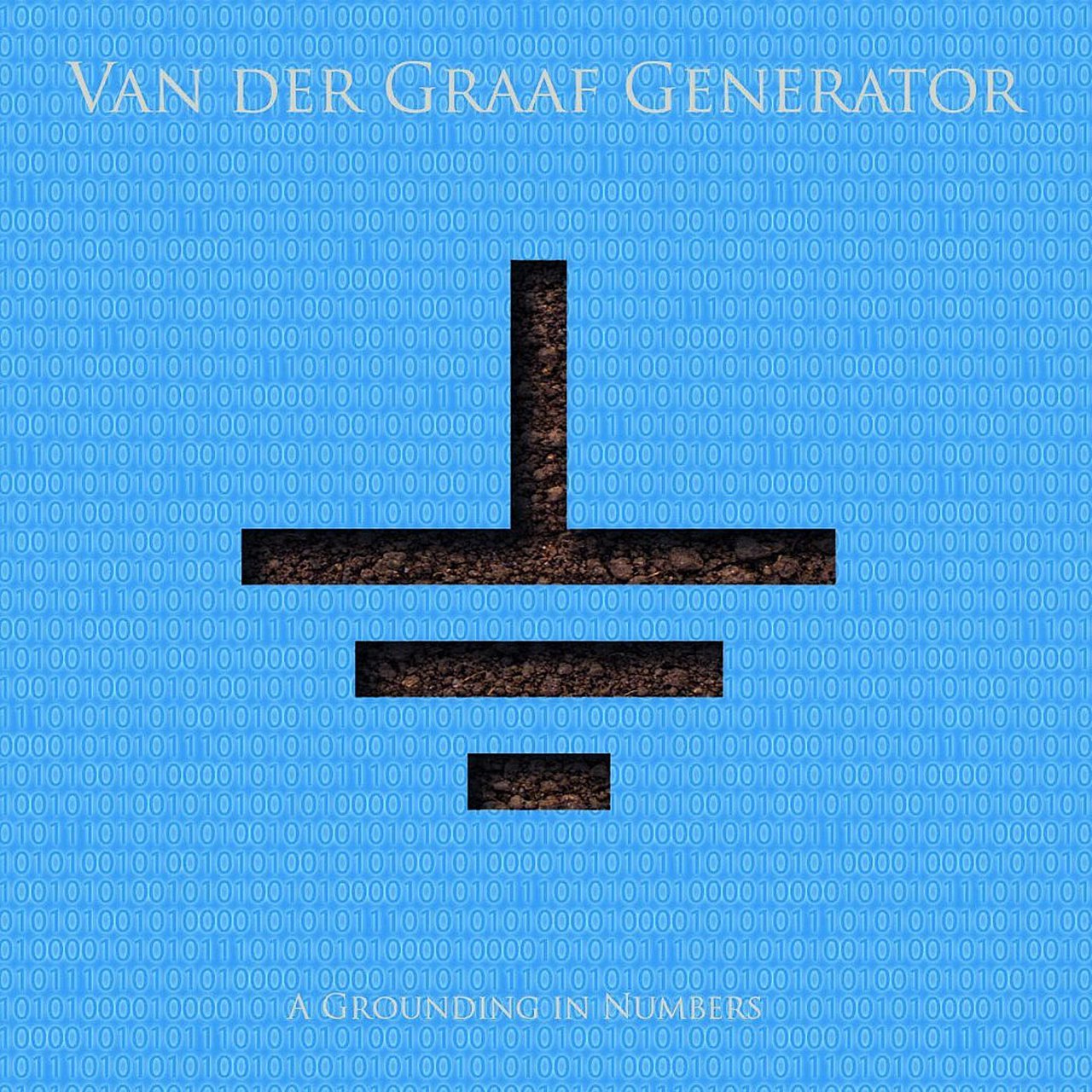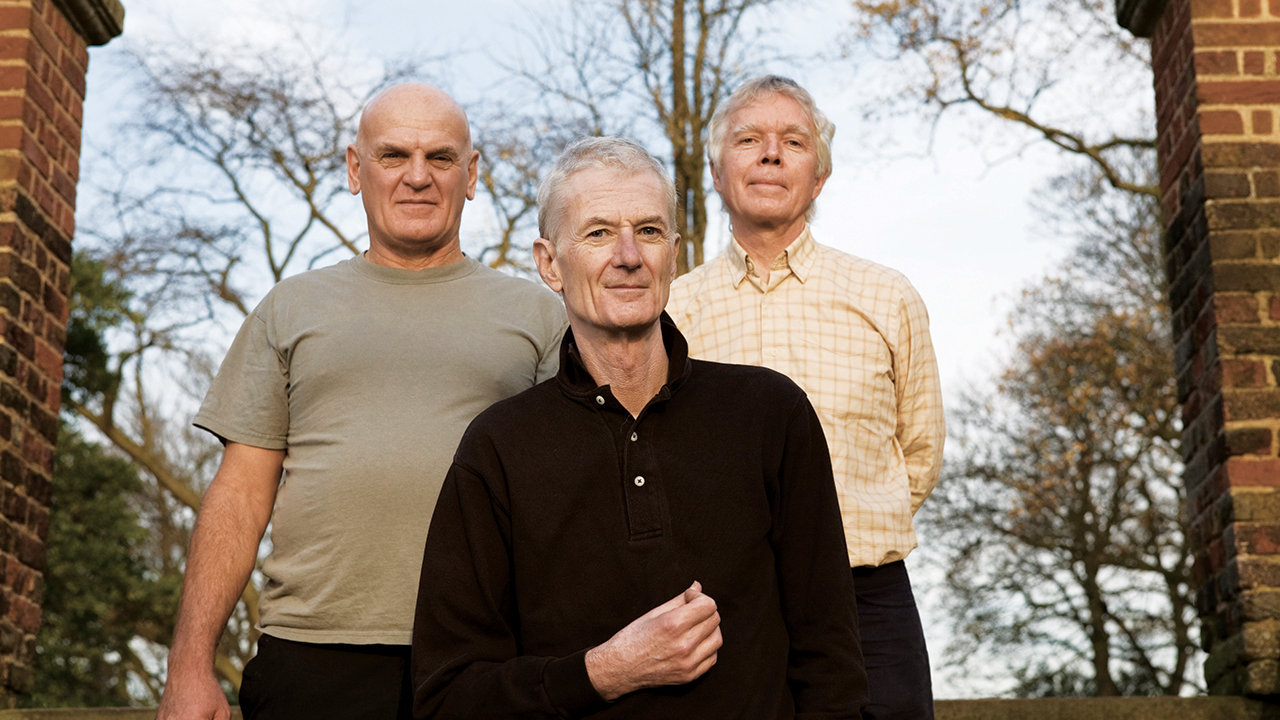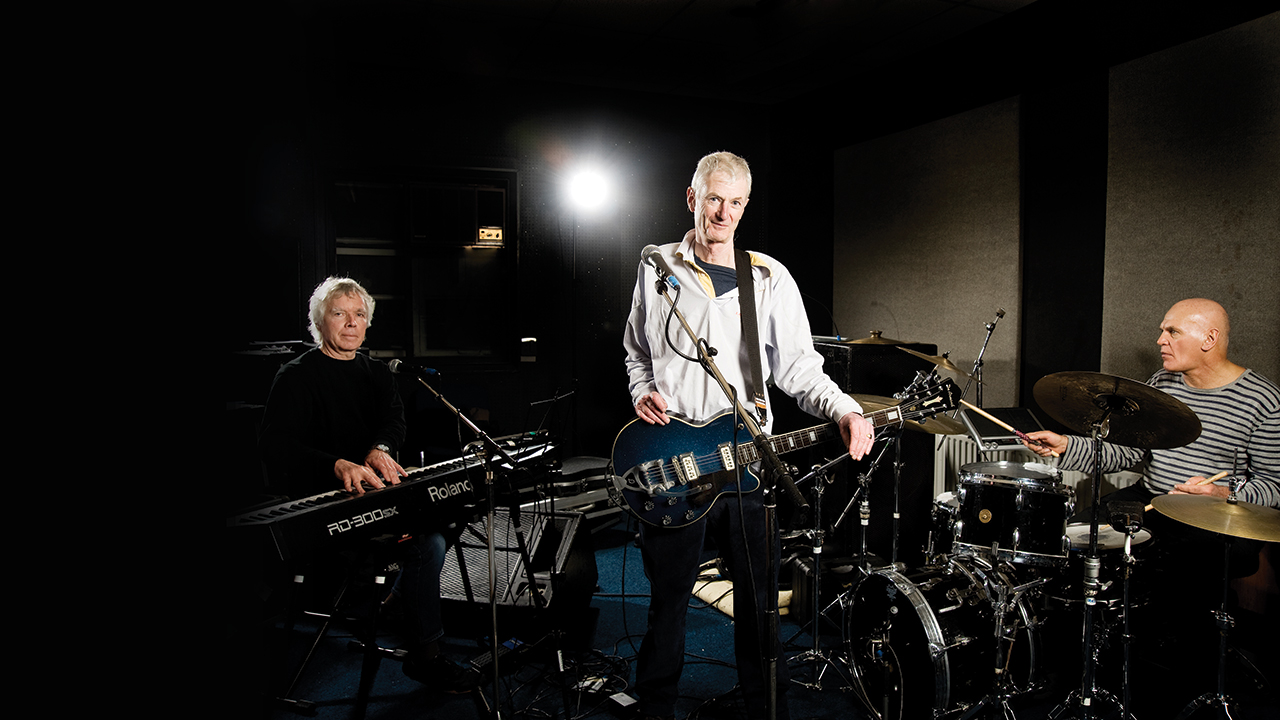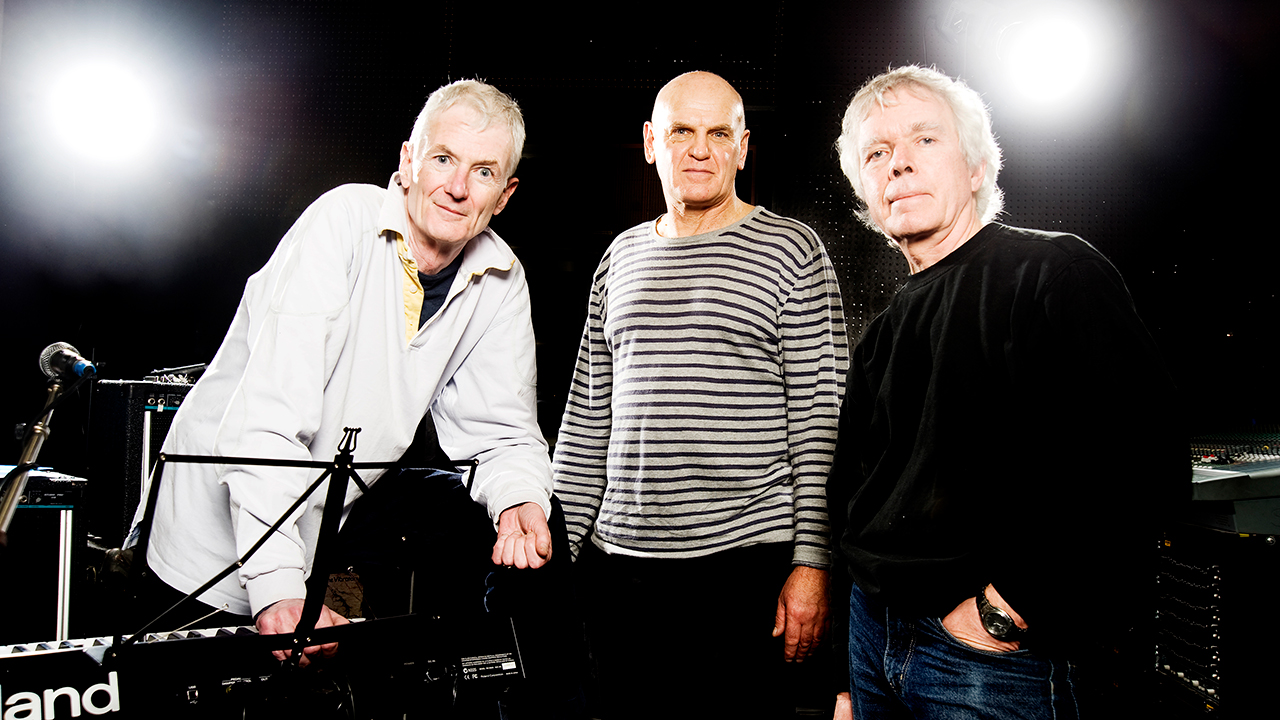"When we first got back together in 2004, I don’t think any of us really thought that in 2010 we’d have our third album recorded," Peter Hammill told Prog writer Dom Lawson when he met the band in rehearsals ahead of the release of 2011's A Grounding In Numbers.
In a small, equipment-littered rehearsal room, somewhere deep the in the cavernous labyrinth of North London’s esteemed John Henry Studios, Van der Graaf Generator are practising a brand new song. It bears the title Mr. Sands and it
is one of three new tracks that the band have decided to perform at London’s Metropolis venue for their first live show following the recording of A Grounding In Numbers, their second album since shedding woodwind maestro David Jackson and becoming a highly resourceful three-piece for the first time. It is not, by Van der Graaf standards, an exceptionally strange or complex song, but it is one that has its fair share of twists, turns and bewildering time signatures, and largely due to the fact that Peter Hammill, Hugh Banton and Guy Evans have never actually played it all the way through before – advances in studio technology now enabling them to build songs piece by piece without the need for capturing complete takes – it’s proving to be something of a stubborn little bugger. After several attempts, all confounded by minor disputes over whether one particular riff is supposed to be played two, three or maybe even four times at one particular point, all three members of the band are beginning to grin mischievously in Prog’s general direction, as if to say, “This is what happens when you allow a journalist to watch you rehearse!”
Finally, of course, all the pieces of Mr. Sands fall elegantly into place, and this rambunctious slab of defiantly awkward but melodically robust rock music rolls precisely from start to finish, much to the delight of those playing it (and, indeed, those watching and listening). Because, despite exhibiting the kind of relaxed collective demeanour that you might expect from a trio of veteran musicians in their sixties, Van der Graaf Generator know full well that when they next step out on stage in front of their loyal supporters, everything they play will be subject to the most intense (albeit highly affectionate) scrutiny. Prog fans are typified by their exacting standards and so when new songs are aired for the first time, they might as well be perfect…
“We’re used to it,” grins Peter Hammill, amused by thoughts of his band’s admirers and their near-obsessive attention to detail, as he, Banton and Evans congregate in the studio’s canteen to chat with Prog. “I have to say, in terms of our audience, they’re strict but they also don’t want us to do the same thing. Obviously in all genres of music there are fanbases who do want people to repeat the same things, from a band’s golden age and all that sort of stuff, but I think it’s fair to say that our fanbase expect us to do something different every time.”
“When we re-formed we decided from the start that we weren’t just going to play the hits,” adds Banton. “We were gonna be more than that, and that’s what we’ve done. Year on year, we’re ditching more and more of the old stuff.”
“This show that we’re rehearsing for now, we’ve got three completely new tunes, we hope, although the proof is in the pudding, of course,” continues Hammill. “And then we’re doing Nutter Alert from Present and then Interference Patterns, Lifetime and Over The Hill from Trisector, so that’s seven out of 10 from the new era. Also, the old stuff we’ve been doing differently anyway because we’ve had to reinvent those songs for the trio.”

When the “classic” Van der Graaf Generator line-up of Hammill, Banton, Evans and Jackson originally reunited in 2004, long-time fans could hardly believe their luck, not least because the recorded evidence of the reunion – the fascinating and often brilliant Present double set – was every bit as good as most had hoped. When Jackson left the band two years later, with a major clash of personalities and perspectives being blamed by all concerned (“It became clear to Guy, Hugh and I,” Hammill wrote in one of his gloriously lyrical and heartfelt newsletters, “that whatever happened in the future we were not going to be able to continue being in a group with David.”), many people assumed that the end was unavoidably nigh. Consequently, the remaining trio’s decision to keep the ball rolling steadily forward, and the subsequent recording and release of 2008’s extraordinary Trisector album, has been one of the great unexpected joys of recent prog history, both for the fans and the band themselves.
“Actually, when we first discussed in principle what we were going to do as a trio, we had a list of songs that we thought we could play in one form or another but about half the old stuff we thought ‘There’s no way!’” laughs Hammill. “But with a degree of imagination and a degree of playfulness, it turns out that we are capable of playing nearly everything that we ever played.”
“We ended up dropping things that we were dropping anyway, to be honest,” shrugs Banton. “Simply as an act of attrition.”
“Back in the 70s it was the same thing. We rolled constantly on,” Hammill notes. “And maybe that’s why there is that demand for the new, that we’re not expected to repeat ourselves and the fans expect us to be doing something entirely different every time.”
Watching them rehearse now, it’s not hard to see how these three revered artisans found a way to make this line-up work. Determined, canny and with just the right amount of mad professor-like glee adding style to their substance, they clearly love the process of making music together so much that even a major setback like having to effectively reimagine and rewrite large sections of their back catalogue will have been cheerfully brushed aside as just another hill to nimbly climb.
“I don’t think there was any fear between us at all when we became the trio,” says Hammill. “Basically, we met up and decided that this was what we were going to be doing, and then we got together and played for the first time. We had an exploratory first week, just playing, and we did some old songs then just to see if we could do it and we realised through that that yes, we could definitely do it. There was some trepidation the first time we played live as trio, but people were very accepting straight away. So it was never in doubt, as they say! Ha ha ha!”

Recorded earlier in 2010, the three-man Van der Graaf’s second studio album looks certain to receive an even more positive response than its splendid predecessor. A Grounding In Numbers is a more fluid and cohesive record than Trisector, and yet it is also more diverse, more experimental and, at times, quite unlike anything that the band have committed to tape before. Somehow, it seems, becoming a trio has enabled Hammill and his comrades to expand their horizons. Within the delicate melancholy of album opener Your Time Is Now, the thunderous sharp angles of the decidedly punky Highly Strung and the grandiose menace of the closing All Over The Place, you may actually witness the sound of this band growing before your very ears…
“Oh, I’d say that’s certainly the case!” beams Hammill. “Actually, the variety of what we’re doing now is much greater. On this album we have a lot of short songs, which is a new thing. The process of writing is quite different. Recently we’ve spent a lot of time transferring files and ideas before we record and ending up with a collection of things which are on a list and we might do this or we might do that, and some of them may be complete songs or just a noise track or a riff and we build things up that way. May I use a sports analogy? We do a lot of visualisation before we get to the pitch. We go through the thing we’ve done on the training pitch a number of times and that seems to be working for us.”
With its numerous unsettling instrumental interludes, short sharp song structures and overall air of feverish exploration, A Grounding In Numbers confirms anew the undeniable truth that this band were never disciples of the same musical philosophy or methodology that informed the great works of Yes, Genesis or ELP. This most wilfully individual of progressive rock bands continue to disregard what everyone else is doing and sound, more so now than ever, like they really enjoy making a racket, closer in spirit, approach and delivery to bands from the post-punk era or to the freewheeling anti-commercialism of the avant-garde than to Pink Floyd.
“Oh, absolutely, yeah,” Hammill agrees, nodding furiously. “There are a couple of pieces on the album that really are just pure racket. In my mind, at least, we’ve always been a rock group and I still write three-chord tricks and like bashing it out. Also on this record, HB [Banton] is playing much more bass, which again was a natural process. Embarrassingly, we now find ourselves in the potential position of being a traditional power trio! If we’re not careful it’ll be ‘leather trousers ahoy!’ Ha ha!”
“I didn’t even realise until one of the new tracks was almost there that I’d actually done a drum solo this time!” splutters an exasperated but grinning Guy Evans. “It was actually led by Peter. He had this atmospheric thing, on a day in the studio when we were doing these short bits that could be interludes or maybe not, and I had an instruction to just play some ‘underwater drums’. I was under the impression that it would be a bit of a song, but it turns out that it’s a complete track. I haven’t played a drum solo since 1968!”
As if to pre-empt and swiftly negate the notion that they might be turning to Grand Funk Railroad, A Grounding In Numbers maintains the lyrical quirkiness that made Trisector such a fiendishly entertaining and surprise-filled debut for the three-piece Van der Graaf. Numerous subjects are given the Peter Hammill treatment over the course of the record, but it is the potent allure of numbers that dominates proceedings. From the album’s title through to the self-explanatory Mathematics and on to the distinctly unnerving 5533, it’s almost as if the band’s image as somewhat awkward and nerdy post-graduate career musicians, with heads buried permanently in some impenetrable volume or other, has driven them to embrace their inner geek with a new level of enthusiasm.
“I don’t think that any of us are totally maths geeks, but it is a beautiful thing,” Hammill smiles. “You don’t have to be into maths to get that. It’s a pure and beautiful thing and it works for Mathematics, which is a peculiar and bonkers rock song! My wife can’t get her head round it still, but it’s a maths geek’s love song to maths. I received no horrified emails from the others when we were writing it, so it must be okay! It’s playful stuff that we can all relate to. On Trisector there’s a song about losing your glasses [All That Before], because we are of a certain age and that happens. The lyrics are serious but they are also playful and they’re generally about stuff that the three of us are interested in, so it’s not just me going off on one!”
“Most of the time, when I read Peter’s lyrics, my feeling is ‘Fine! Why not?’” adds Banton. “As long as it does have that playful overview or that resonance, I have no reason to object. I’d much rather go for a song about maths than anything approaching the prog lyrical orthodoxy, whatever
that might be.”

2011 promises to be a busy year for Van der Graaf. A new album will inevitably lead to some fairly extensive touring, something that the band have grown used to (again) in recent years, but unlike many of their vintage peers, VdGG will not simply be dragging the decaying carcass of an ageing back catalogue around. Instead the vast majority of their current repertoire comes from the records they have made since 2005’s re-formation, and although old classics like Man-Erg and Childlike Faith In Childhood’s End will doubtless be wheeled out to uproarious applause, there’s a tangible sense that this is a very different band from the one that originally recorded them.
“I think that’s partly true and partly not, but it certainly feels more organic now,” nods Guy Evans. “It feels like we leave a lot more to the band’s capability to respond to the material, in a way. Things change over the course of a tour and there will be some very extreme differences in the way that things are performed from one night to the next.”
“We’re definitely in bonus territory now, aren’t we?” says Hammill. “Even when we first got back together in 2004, I don’t think any of us really thought that in 2010 we’d have our third album recorded, and that we would have toured the States and Canada. I think it’s the impetus of being a trio that has enabled us to do that. There’s a balance of responsibility and trust in this line-up. We’re fortunate, if you like, that at our age we’re all still hale and hearty and we have the capacity to play and to sing. It gained a momentum that we weren’t expecting.”
Back in rehearsal mode, Hammill, Banton and Evans are hitting their stride now, tearing through a now finely-honed Mr. Sands and treating Prog to a sublime version of Trisector highlight (We Are) Not Here. Devoid of the theatrical atmosphere of a live gig, this is as intimate and real as it gets, and the experience reveals something very important about this band and what they represent. While many are content to tread the nostalgia trail and deliver slick renditions of well-worn blasts from the past to spoilt crowds who know what they want all too well, Van der Graaf Generator are alive and fizzing with the excitement generated by new ideas, new noises and new ways to celebrate a potent and enduring working relationship; one driven by a real sense of urgency that bands of this vintage can only dream about.
“I think you’re probably right, that there is a sense of urgency to what we do now,” concludes Hammill. “I personally haven’t backed off enough from this record to be able to get that sense from it yet, but it’s there, like with Your Time Starts Now which basically says ‘Time starts now, get on with it, do it!’ And then there are all these short pieces on the record that push things along, saying much the same. We like the challenge, of passing the baton between us and negotiating that assault course in each song. It’s exciting, isn’t it?”

